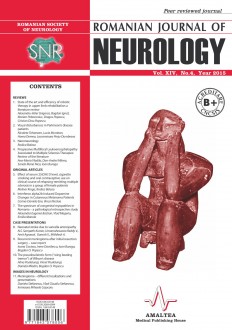SELECT ISSUE

Indexed

| |

|
|
|
| |
|
|
|

|
|
|
|
|
|
| |
|
|
HIGHLIGHTS
National Awards “Science and Research”
NEW! RJN has announced the annually National Award for "Science and Research" for the best scientific articles published throughout the year in the official journal.
Read the Recommendations for the Conduct, Reporting, Editing, and Publication of Scholarly work in Medical Journals.
The published medical research literature is a global public good. Medical journal editors have a social responsibility to promote global health by publishing, whenever possible, research that furthers health worldwide.
NEONATAL STROKE DUE TO VARICELLA ARTERIOPATHY
N.S. Sampath Kumar, Reddy V. Umamaheswara, Amit Agrawal, V. Ganesh and A. Mithilesh
ABSTRACT
Varicella zoster is one of the common infective etiological factors known to produce arteriopathy of cerebral vasculature. Varicella zoster infection spreads transaxonally first to the adventitia and later transmurally to intima. Primary infection or reactivation of varicella zoster, both are associated with involvement of cerebral vessels of large as well as of small calibre varicella zoster associated arteriopathy was reported up to 12 months after the infection. Recurrence of strokes are seen post varicella infection. Hence the identification of varicella zoster as an etiological agent of ischemic stroke in neonatal age group patients is necessary and requires follow-up. Other neurologic sequelae following varicella infection are aneurysm formation leading to subarachnoid and cerebral haemorrhage, carotid dissection and rarely peripheral arterial disease. Due to lack of adequate epidemiological, neuroimaging and laboratory data, guidelines for treatment of varicella ateriopathy are not clear.
Keywords: post varicella arteriopathy, varicella zoster, arterial stenoses, middle cerebral artery, post varicella sequelae, seizures
Full text | PDF
